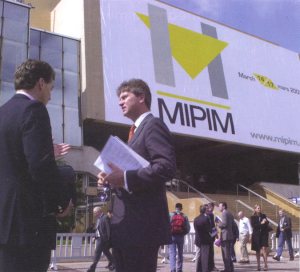
C |
annes, FRANCE — Europe is sprouting a daisy chain of real estate Web sites likely to move much of the corporate real estate sector online continentwide in a bare few years. Typical of the fragmented linguistic patchwork of markets, each country is developing its own national approach. But from Viking “full-market access” to Gallic selectivity, the race is on to provide prime-time access to a range of properties all across Euro land.
These were only some of the themes debated here at the 12th edition of MIPIM, the world’s premier property extravaganza, where a record 15,146 professionals from 58 countries roamed the labyrinthine corridors of the Palais des Congres to mix with 1,985 exhibitors from 44 countries. Some 5,823 firms attended from all sectors, up 18 percent over last year. A whopping 3,721 international investors flocked to the show, up 23 percent, along with 1,109 international occupier firms, up 27 percent, continuing the trend noted last year.
Germany fielded the largest group of exhibitors (399) followed by the UK (358), France (316), the United States (109), the Russian Federation (67) and Italy (61). The Paris City stand drew a flock with an impromptu fashion show.
France, in March. Included were 3,721 international investors and 1,109 occupier firms.
Internet Takes Center Stage
 This year the Internet hogged the limelight as an increasing number of real estate Web sites begin to emerge around Europe, providing a wide variety of services to meet the mushrooming demand for everything from listing to online transactions.
This year the Internet hogged the limelight as an increasing number of real estate Web sites begin to emerge around Europe, providing a wide variety of services to meet the mushrooming demand for everything from listing to online transactions.
In line with the Nordic advance over other European regions in high tech, the Swedes have moved fast to position themselves in the Web bazaar.
Says Urban Edenstrom, CEO of Sweden’s Newec, which houses Datscha.com, launched last November with 140 shareholders on an investment of US$9.3 million and already boasting positive cash flow: “Europe’s commercial property market matches the $7 billion value of the continent’s stock market. Once we raise the level of transparency and efficiency to that of the financial markets the turnover will rise, and the risk premium will fall. The Internet is transforming the real estate world. It’s not a matter of where the Internet will play a dominant role, but when and how.”
The presence of (from left) Urban Edenstrom, CEO of Sweden’s Newec; Jim Muttram,
electronic publishing director of EGI; and Julien Pila, Webimm.com’s commercial
director, represents Europe’s movement toward Web-based real estate processes.
According to Edenstrom, Datscha.com is even more comprehensive and more technologically advanced than what is available in the United States.
“We are a CoStarGroup look alike, but we provide far more in market range and in sophistication,” says Edenstrom. “For example, we showcase every single commercial property on the market in the countries we target while others only display segments of the market or simply what they are offering. In Sweden and Finland alone we give access to 300,000 properties.” (Costargroup.com is a U.S.-based transaction site.)
The Datscha.com strategy, according to Edenstrom, is to provide an “intelligent” marketplace. Datscha.com displays detailed information from an integrated database in the local language with video or pictures on all commercial properties in the target countries covering rents, vacancies, size in square meters, values, ownership, when the property was bought and the like. Using a map, surfers can find out about properties in the same neighborhood of a property that is of interest.
Says Edenstrom: “Let’s assume you’re a broker. You can go into our site and find out who are the registered buyers for a property and if you don’t find enough registered buyers, you can look for those who have bought similar properties in the past few years. You can even find out who owns what property within a 100 yards (91.4 m.) of the property that interests you. It’s a highly sophisticated and comprehensive platform. When we’re finished with the Nordic countries, we plan to move into Germany, France and other European countries and provide the same service.”
Datscha.com offers some attractive technological “toys.” The site provides tools that allow users to download masses of graphs and figures to their own system for comparisons. The tools allow users to do 10-year cash flow forecasts, a first in the field.
“We are working with Nokia to enable users to consult the data on wireless using WAP technology,” says Edenstrom. “We eventually see ourselves serving 500,000 professionals all over the European Union.”
Currently 300 clients, from brokers and owners to banks and land surveyors looking for clients, pay a $5,000 annual fee per country for access to the system. The latest version of the software was unveiled only last month (June 2001).
Interestingly enough, according to Edenstrom, the banks have been the site’s most active users, with brokers a distant second.
“Today most of our income is from subscription,” says Edenstrom. “But in the future income from transactions will grow substantially. All of Europe will eventually be online.”
UK Joins the Game
 The UK is also sprouting virtual real estate boutiques in keeping with its premier position as Europe’s flagship site for inward investment. Leading the pack, Estates Gazette has upgraded its property link to a full-grade transactional site where buyers and sellers can network and close deals. Says Jim Muttram, EGI’s electronic publishing director: “If you want to sell a property, you log onto the site, list the property address, register the details, validate them with contact information and set it sailing on the Web.”
The UK is also sprouting virtual real estate boutiques in keeping with its premier position as Europe’s flagship site for inward investment. Leading the pack, Estates Gazette has upgraded its property link to a full-grade transactional site where buyers and sellers can network and close deals. Says Jim Muttram, EGI’s electronic publishing director: “If you want to sell a property, you log onto the site, list the property address, register the details, validate them with contact information and set it sailing on the Web.”
Likely to have providers looking over their shoulder, the site craftily imitates the broker’s in-depth knowledge and makes it available to buyers.
“From a buyers perspective, there’s a clever search engine that proposes you properties even when an exact match hasn’t been made,” says Muttram. “The engine plays the classic role of the agent who says to a buyer looking for an office space on Beacon Street, ‘Well I haven’t got one on Beacon Street, but I’ve got one on Wardour Street.’ “
During the second half of last year, according to Muttram, volume soared from 1,000 properties last July to 14,000 at year’s end with use by everyone from agents to one-time users.
which had 399 exhibits. Total number of exhibitors was 1,985.
You Get What You Pay For
Different categories of listings on the EGI site allow surfers to get what they want at the price they want it.
Says Muttram: “We have a free list, but we also have more expensive listings with multimedia and video that allow virtual visits. Our research shows that buyers are nine times more likely to find what they want with the expensive lists. We can see users eventually moving to the virtual transaction with leases and investments done online followed by securitization.”
In France, five of the major players (Auguste Thouard, Bourdais, Jones Lang LaSalle, CB Richard Ellis and DTZ) have joined forces to launch Webimm.com, a site focused on the office market in the Paris region as well as Marseilles and Lyons, France’s second and third prime office markets.
As a Gallic touch, Webimm.com operates as a private club with 10 members who have exclusive right to display ads (cost is $539 for six months). The highly selective placement limits the number of properties visitors have to wade through. Access is free for companies searching properties
“We are not a news magazine aimed at a volume market,” says Julien Pila, Webimm.com’s commercial director. “We take advantage of the Internet’s fantastic ability to disseminate large quantities of information to the marketplace. But at the same time, we pre-select the data to present only upmarket properties. Rather than provide transaction facilities, we ensure the user has the level of quality information that allows the transaction to take place in the best possible circumstances.”
With an eye on corporate executives new to Websurfing, the site strains to make visits simple, speedy and efficient. Visitors can choose from specific categories (offices, warehouse space, retail sites and more) and indicate the size and postal zone in Paris, Marseilles or Lyons to narrow their search. Webimm.com executives are canvassing professional real estate organizations to get agreements on a database of statistics to be made available to all Webimm.com visitors.
Says Pila: “We are purely business-to-business with over 80 percent of the hits coming from top management, so our audience profile is very targeted. We are showcasing over 500 corporate properties in exclusive or co-exclusive categories, representing 20 million sq. ft. (1.9 million sq. m.) of space available on the French market with weekly updates to keep the list evergreen.”

